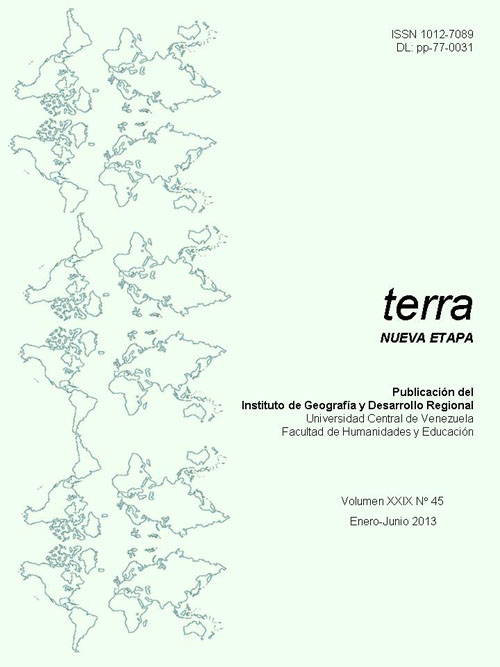CONCENTRACIONES DE PARTÍCULAS TOTALES EN SUSPENSIÓN (PTS) Y SU CARACTERIZACIÓN QUÍMICA, DURANTE EL PRIMER PERÍODO LLUVIOSO DEL AÑO 2004, EN LA ATMÓSFERA DE LA CIUDAD DE MÉRIDA, VENEZUELA2
Palabras clave:
Contaminación Atmosférica, Partículas Totales en Suspensión (PTS), Partículas Depositadas (PAD), Metales Asociados a PTS, Mérida, Venezuela, Air Pollution, Total Suspended Particles (TSP), Particle Deposited (PAD), Metals Associated With Tsp, MeridaResumen
La contaminación atmosférica está entre los graves problemas ambientales y de salud que confrontan nuestras ciudades, debido al incremento de la población, expansión urbana y aumento desordenado del tráfico automotor. En este trabajo se recogieron muestras de partículas en suspensión (PTS) en el aire, con un equipo Hi-Vol y partículas depositadas (PAD) en la superficie, en la ciudad de Mérida, Venezuela, para el período marzo 1 a junio 30 de 2004. Las muestras fueron analizadas conforme a técnicas físicas y químicas establecidas, además se realizó un análisis de la data meteorológica local. Los principales resultados indican que en la ciudad de Mérida, para el lapso de muestreo, el aire podría considerarse limpio. Que el magnesio, calcio, aluminio, plomo y manganeso asociados a las PTS provienen de fuentes naturales más fuentes antrópicas; mientras que el sodio, zinc, potasio, cobre, níquel y vanadio proceden sólo de fuentes antrópicas, y que el lavado de la atmósfera está muy relacionado con la intensidad de la lluvia, siendo este proceso más importante en los meses de mayo y octubre. En Mérida los factores que más afectan el transporte y deposición de los contaminantes son la brisa de valle, desde el suroeste y los eventos pluviométricos que controlan el lavado de la atmósfera local.Concentrations of total suspended particulate (tsp) and chemical characterization during the first rainy period of 2004, in the air of the city of Merida, Venezuela
Abstract
Air pollution is among the serious health and environmental problems facing our cities, due to population growth, urban expansion and increased disorderly automobile traffic. This paper deals with the sample collection of total suspended particles (TSP) in the air, with a Hi-Vol instrument and deposited particles (PAD) on the surface, in the city of Merida, Venezuela, during the period March 1st to June 30th, 2004. The samples were analyzed according to the established chemical and physical techniques; in addition a local meteorological analysis was performed. The main results indicate that in Merida, for the sampling period, the air may be considered clean. That magnesium, calcium, aluminum, lead and manganese associated with the PTS come from either natural sources or anthropogenic sources, whereas the sodium, zinc, potassium, copper, nickel and vanadium come only from anthropogenic sources. The washout of the atmosphere is closely related to the rain intensity, being this process more important in May and October, which are months peak-rainfall. In Merida, the factors that affect the pollutants transport and deposition are the valley breeze from the southwest and rainfall events that control local atmospheric washout.
Descargas
Los datos de descargas todavía no están disponibles.
Descargas
Número
Sección
Artículos

